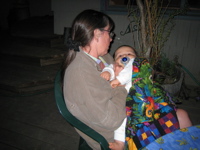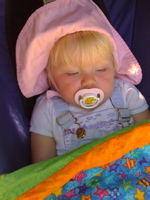
Pacifiers allow babies to sleep in strange places and with other
caregivers. (# 139) A rested baby is a happy baby.
A rested baby is a happy baby.
(# 0051) |
To
Pacify... Or Not
452 words
How To Handle the Sucky Thing
by Dianne Roth
As a young parent, it was clear: There would be no pacifier for my children. As a grandma, I have a whole different view.
My children were born in the 70’s, when the culture was imposing strict standards for raising children. I was told by my parents, my friends, and my pediatrician that pacifiers were bad and that letting children cry it out was good.
One of my children had an attachment to his blanket and the other one sucked his thumb. Both had crying spells when they could not be consoled. Now that I am old enough to think for myself, I know that things could have been different for my children.
All infants have times when they cannot be consoled. We feed them, change their diapers, cuddle them, but nothing seems to work to calm them down. We can let them cry in their beds while we cry in the hall, or we give them a pacifier.
Both of my daughters-in-law have allowed their children to have pacifiers. Of my three grandchildren, two needed to suck and one did not want to be bothered. Here is how they have handled the “sucky thing”.
First, both decided to do whatever possible to keep their infants from crying. There is evidence that the less babies cry, the less they need to cry.
Second, when all else failed, the babies were offered a pacifier. When they were offered the pacifier, the babies were cuddled to help them calm down. At bedtime, they were put into their cribs with their pacifiers.
Up until the age of two, my oldest grandson was given the pacifier whenever it was requested. He was not given unlimited access. During meals, play, and bath time, it was unnecessary. He was told to take it out of his mouth when he talked.
At the age of two, the pacifier was only available in bed or in the car. It was still available upon request, but he had to “visit” it in the bed or while he was in his car seat. A few months before his third birthday, he was told that when he turned three, he would no longer get a pacifier. By his third birthday, the pacifier was gone.
The pacifier allowed him to settle down, to learn to comfort himself, and kept him from developing the habit of crying. His transition from dependence to independence was made with only minor fuss. I wish I had known better 30 years ago.
Dianne Roth is a teacher, mother, grandmother, and freelance
writer. She lives in Oregon.
|
|




